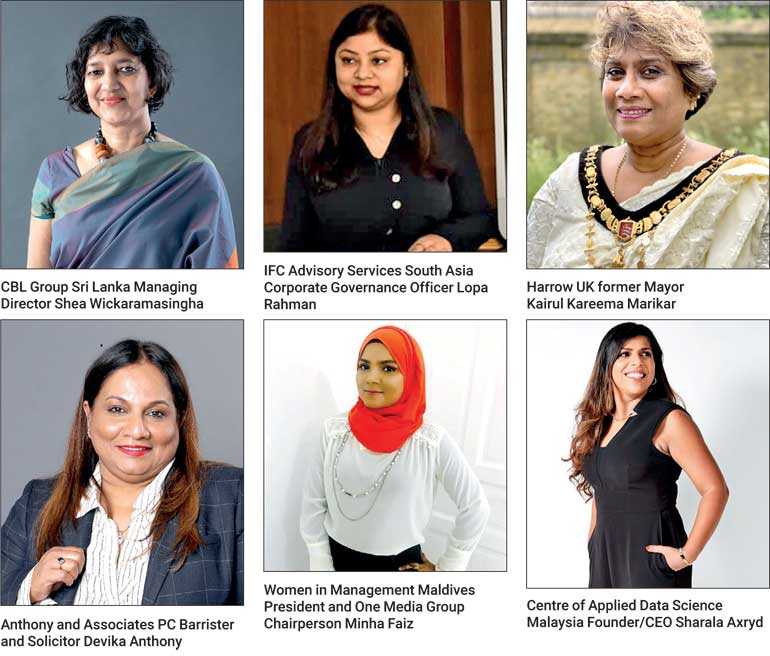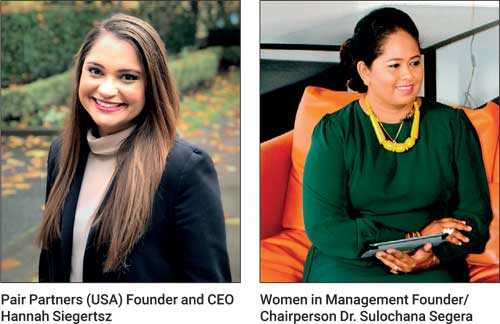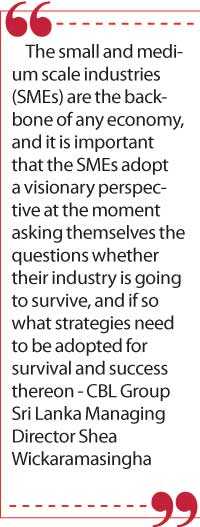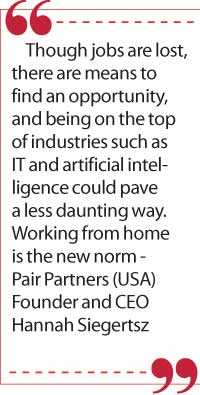Friday Feb 27, 2026
Friday Feb 27, 2026
Monday, 8 June 2020 00:22 - - {{hitsCtrl.values.hits}}

 By Medha de Alwis
By Medha de Alwis
An online discussion on the impact of COVID-19 on women-owned businesses globally was hosted recently by the Women in Management.
The discussion that was powered by One Media Group and partnered by the International Finance Corporation (IFC) of the World Bank group had panellists from different countries such as Shea Wickaramasingha Group Managing Director CBL Group Sri Lanka, Devika Anthony Barrister and Solicitor Anthony and Associates PC Canada, Minha Faiz President Women in Management Maldives and Chairperson One Media Group, Lopa Rahman Corporate Governance Officer South Asia Advisory services IFC (South Asia), Kairul Kareema Marikar Past Mayor of Harrow UK, Sharala Axryd Founder Chief Executive Officer The Centre of Applied Data Science Malaysia and Hannah Siegertsz Founder and CEO Pair Partners (USA). The panel was chaired by Dr. Sulochana Segera Founder and Chairperson Women in Management.
The discussion intended to discuss the impact on companies and businesses in general, thereby fathom the situation that these businesses would face post-COVID-19 and to decipher means of successfully confronting the challenges that would so be met.
Resilient nation
Shea Wickaramasingha stated that she considers Sri Lanka to be a resilient nation which has come face to face with COVID-19 just as much as she was recovering from traumatic Easter attacks. Wickaramasingha expressed her opinion that small and medium scale industries (SMEs) are the backbone of any economy, and it is important that the SMEs adopt a visionary perspective at the moment asking themselves the questions whether their industry is going to survive, and if so what strategies need to be adopted for survival and success thereon.
Online overnight
Wickaramasingha as much as the other panellists expressed the opinion that the world of business turned online overnight for those who were not already online, and became fully online for those who already were. When the Sri Lankan government locked the island down in March, there was no clear plan as to what the delivery and purchase procedure would be. However the businesses immediately adopted themselves by going online realising the advantages of an online system, which shows the resilience of the nation, said the Group Managing Director of the CBL Group. She reinstated her opinion of Sri Lanka being a resilient nation by stating that that it is the quality that given a push, taking the opportunity to successfully deliver.
Opportunities for small businesses
As some agricultural imports are banned, there is a vast scope of opportunity for the agricultural sector. Most of the land is owned by small holders in which women too play an important role, these being family units or extended family units. The small businesses tend to have a streak of success given the extreme focus the small business owner puts into the business to be self-sufficient. Hence with the import-export ratio taking a new turn, the post-COVID-19 era may provide the small business owner and the small scale agricultural land owner with a new land of opportunities if intelligently utilised.
Late lockdown
Kairul Kareema Marikar past Mayor of Harrow UK, expressed concern that Britain and London in particular were too late to lock down. The said decision has made Britain another Italy, said the past Mayor answering a question from the Panel Chair on how businesses in the UK are affected due to COVID-19. Many businesses have gone under, particularly small businesses. The surviving businesses are unable to pay the staff and there is a heavy lay off.
Domestic violence
Dr. Segera voiced her concern of domestic violence that takes place due to confinement to the domestic arena as well as the stressful economic and social conditions arising out of COVID-19. Though the panel did not specifically sight any data to the effect, they were concerned of the rise in domestic violence during the pandemic.
 |
 |
 |
 |
Positively onward
Lopa Rahman Corporate Governance Officer South Asia Advisory Services IFC (South Asia) explained that there is a quota that a 10% of the IFC workforce has to be women, this being a progressive quota hence it would increase with advancement of time. The objectives of the IFC Advisory Project are to raise the overall governance standard and practices and to increase the number of women in board room and senior management, thereby improving the financial performance of companies with an enhanced governance structure and a diverse and stronger management.
Rahman who oversees operations in the five countries; Sri Lanka, India, Bangladesh, Nepal and Bhutan, sighted facts for the latest World Bank report released recently; stating that there would be a definite drop in the economies in South Asia. Prior to COVID-19, the growth rate had been speculated to be 6.3%, but now it is expected to be as low as 1.2%. India and Bangladesh are foreseen to record a low growth where are Sri Lanka and Maldives who depend heavily on the service sector are forecasted to report little growth, if not no growth at all.
A three-step path was spelled out to positively look at the crisis. Firstly a business needs to understand that COVID-19 is a macro economic situation of which nothing much can be done as it has already occurred. Secondly, without feeling depressed with the gloom that surrounds, one could channel the energy saved from commuting to work. Rahman pointed out that the time saved in the traffic and the tiredness that comes with it, can now be saved. And there is an opportunity to do a task at a convenient time, rather than doing it at a particular given time. However it is important to note whether one is working from home or working for home. As the flexible timing and more time at hand to spend with family is granted due to the indispensable situation, one needs to make sure that a portion of the energy saved is channelled to make work more productive.
Thirdly, rather than feeling challenged with an impending or an unavoidable layoff, women must use this for their benefit. There is much learning that happens in the form of webinars, extensive opportunities at the World Wide Web and reputed online courses, most of which are completely free of cost. Such opportunities should be availed at; seeing COVID-19 as an opportunity to improve and develop oneself.
Advisory service
Talking about the role of IFC, the investment arm of the World Bank group, Rahman illustrated that the service is two-fold as investment granting and advisory services. The World Bank has announced a fast track finance scheme of $ 14 billion, of which $8 billion is accrued to the IFC. However the focus would be on helping out the existing clients.
Tip sheet
A tip sheet was prepared by the IFC advising companies on how to navigate themselves through the process. Leadership of not only companies but also countries will be put to test during post-COVID-19. The said tip sheet would provide a company with an understanding of the modus operandi of setting up a crisis management team which they may use even at another internal or external crisis situation as this would make the internal system robust to face such a challenge. This tip sheet directs towards an overall strategy including of salient components such as food safety in the COVID-19 business environment and importance of tele-commuting.
Online future
It was discussed by the panellists, that many women who have discovered online shopping system for the first time, have made up their mind to continue with online shopping even when the lockdown ends. This could also be the case for online meetings, as the need to travel to a meeting location was proven unnecessary during the lockdown, across the world.
Canadian context
Devika Anthony Barrister and Solicitor Anthony and Associates PC in the Province of Ontario, Canada was appreciative of the Emergency Protocol the Canadian Government adopted since early March. Currently there is a gradual opening of the Province of Ontario. There are a number of relief measures adopted by the government to mitigate the adverse economic impact such as special repayment plans for loads, and provision of a relief of 2,000 Canadian dollars to those who earned over 5,000 Canadian dollars a month. Qualifying businesses are entitled to wage subsidies. Rent release schemes are in effect and facility obtain loans for businesses is available.
Anthony pointed out how the Canadian government has kept the essential services open which includes legal service and consumption of liquor too. Court houses are closed, yet operations take place online. Social distancing and safety measures are strictly imposed, levying a fine as high as 10,000 Canadian Dollars. Interest-free loans are introduced. Businesses are opening up gradually, and Anthony expects that by the months of June or July most businesses would re-open.
Undo the effect
Anthony offered advice for those businesses that are likely to be affected to undo the impact. Reducing the cost of marketing and focusing on cost effective channels such as online gateways, and establishing more work from home opportunity as real estate in Canada is exorbitantly expensive are some of the strategies businesses could frugally adopt.
IT boom
Hannah Siegertsz Founder and CEO Pair Partners (USA), sighted the appalling figure of 22 million people having filed for unemployment benefits in the USA. However Siegertsz emphasised that the media has painted the USA as quite dark, stating the positive trends that are emerging in the USA due to COVID-19 economy are undermined. Though jobs are lost, there are means to find an opportunity, and being on the top of industries such as IT and artificial intelligence could pave a less daunting way. Working from home is the new norm, and Seigertsz openly invited anyone who wishes an online job in IT to contact her on LinkedIn.
Maldivian women
Minha Faiz President Women in Management Maldives and Chairperson One Media Group stated that though there is a comparison between Sri Lanka and the Maldives in terms of the heavy reliance on tourism; only 7% of the workforce engaged in Maldivian tourism are women. In Male’, grocery shops and takeaway food businesses are open, but these are hardly owned by women. The trades that the women are involved in are tailor shops, bakeries, short eat supplies, etc., and they are severely affected by the economic crisis brought in by COVID-19.
Faiz explained that there was already an economic crisis in the Maldives, and it came to the forefront due to COVID-19.
Though there is no researched data on how affected women are due to the crisis, given the economic burden that even the few women business owners were facing, it is no doubt that the situation would have aggravated.
Ramadan online
Answering a question posed by the panel chair; Sharala Axryd Founder Chief Executive Officer of The Centre of Applied Data Science Malaysia explained that the much famed Ramadan bazaar that annually attracts many local and foreign tourists, still happens online this year. She made a comparison with the unemployment rate in the USA, saying that it is a two million unemployment rate that is currently rated in Malaysia, of which 64% are unskilled. Going online is not a surprise for Malaysia, as the country launched a digital economy in 2010. Though the planned digital economy did not take off as intended, all the infrastructure had been placed, making Malaysia all ready to go ahead digital to combat the COVID-19 economic loss.
A second income
A novel feature brought into the discussion by Axryd is that most women in Malaysia have a second income. And this income is mostly earned through an online portal. Now they are forced to use digital media. The first month was a shock situation, as the Malaysian culture is habitual to meet people face to face and do business. But things have changed now and working from home has become the new norm.